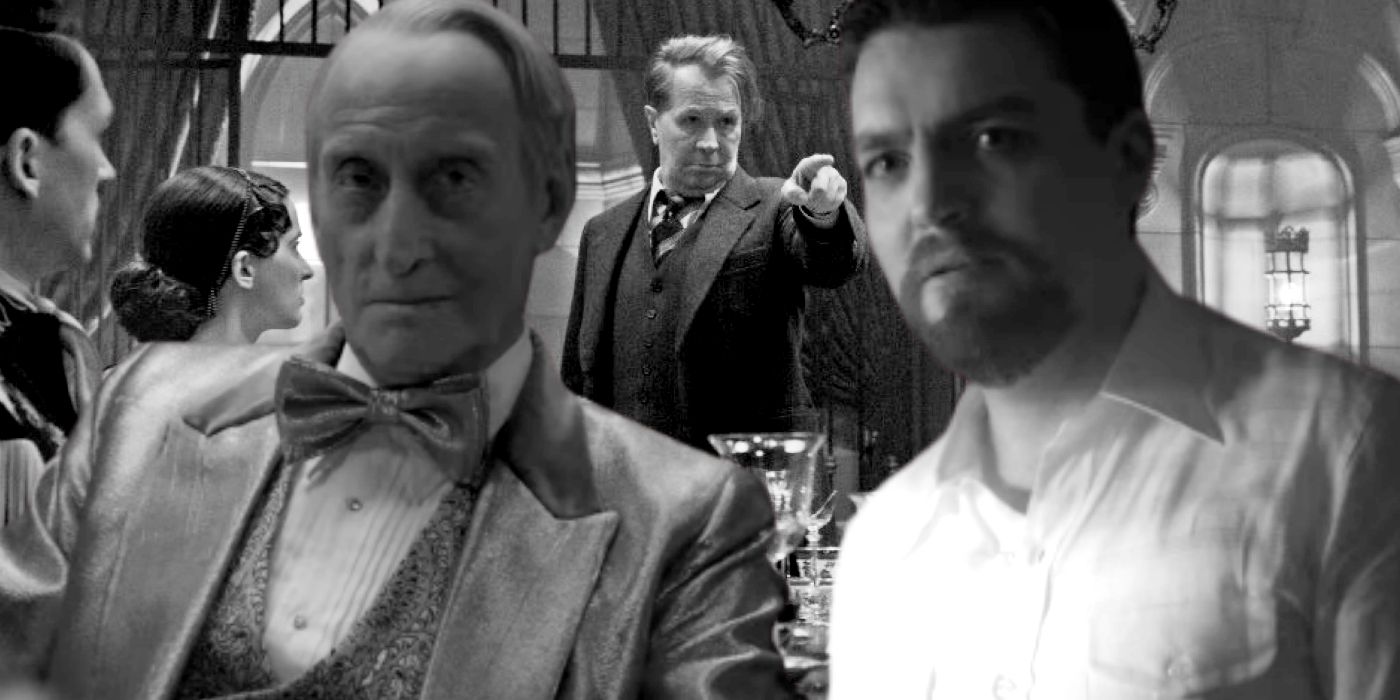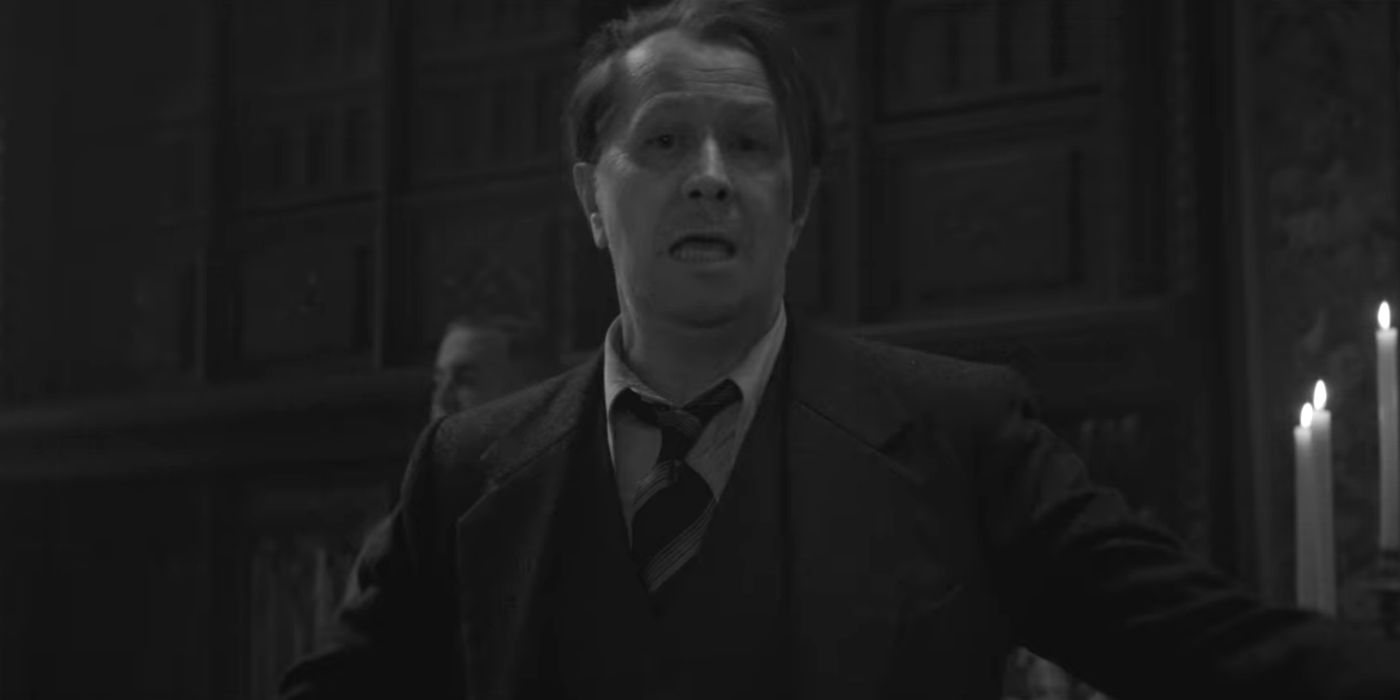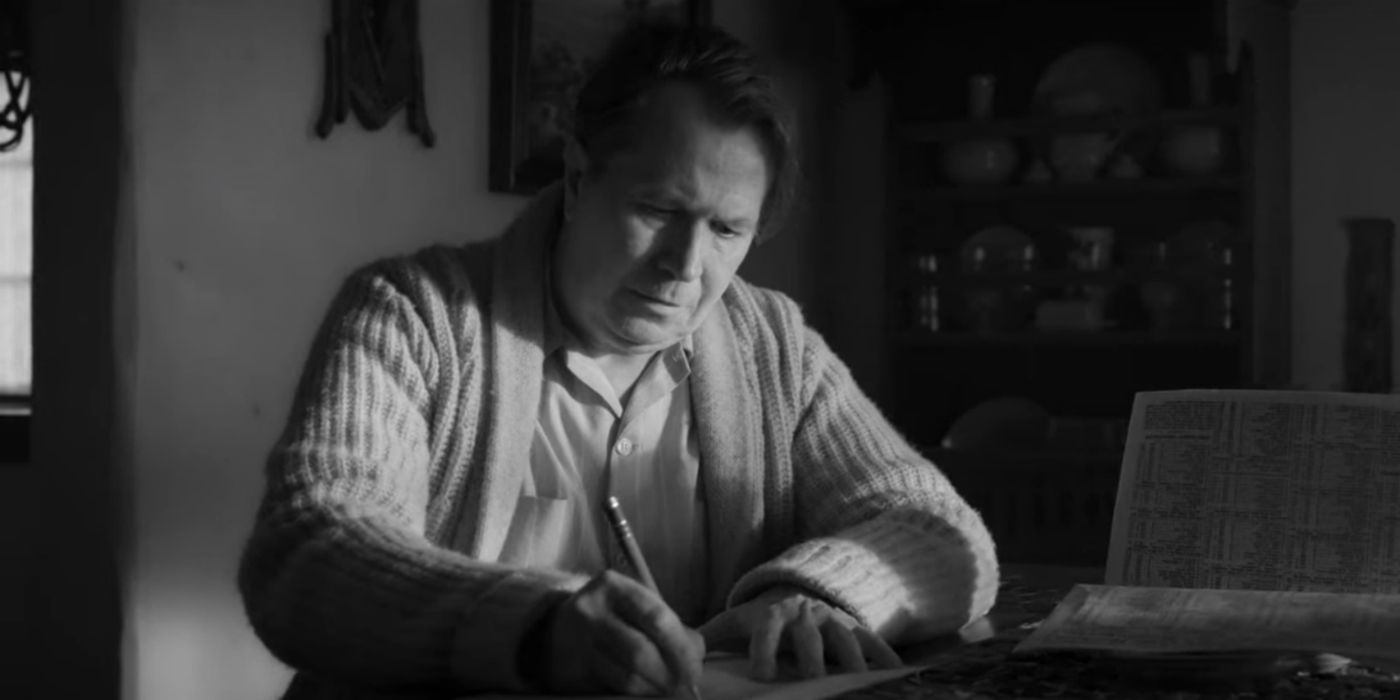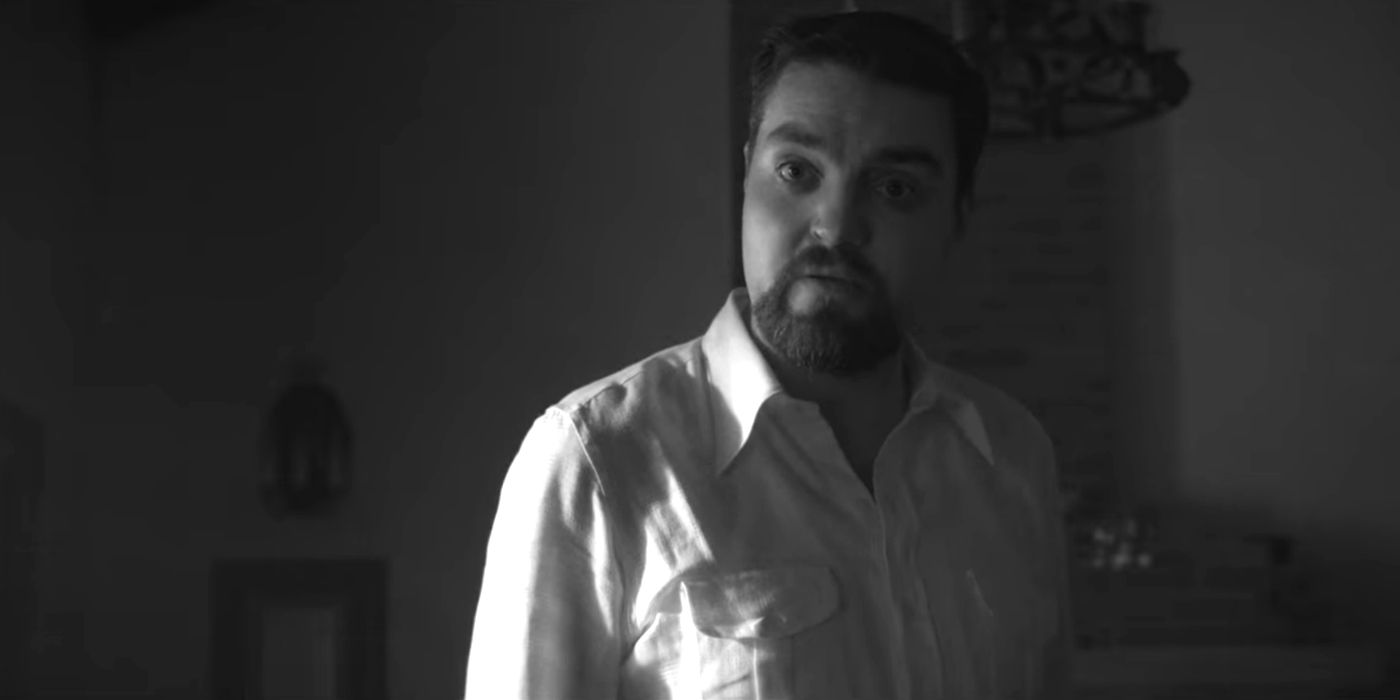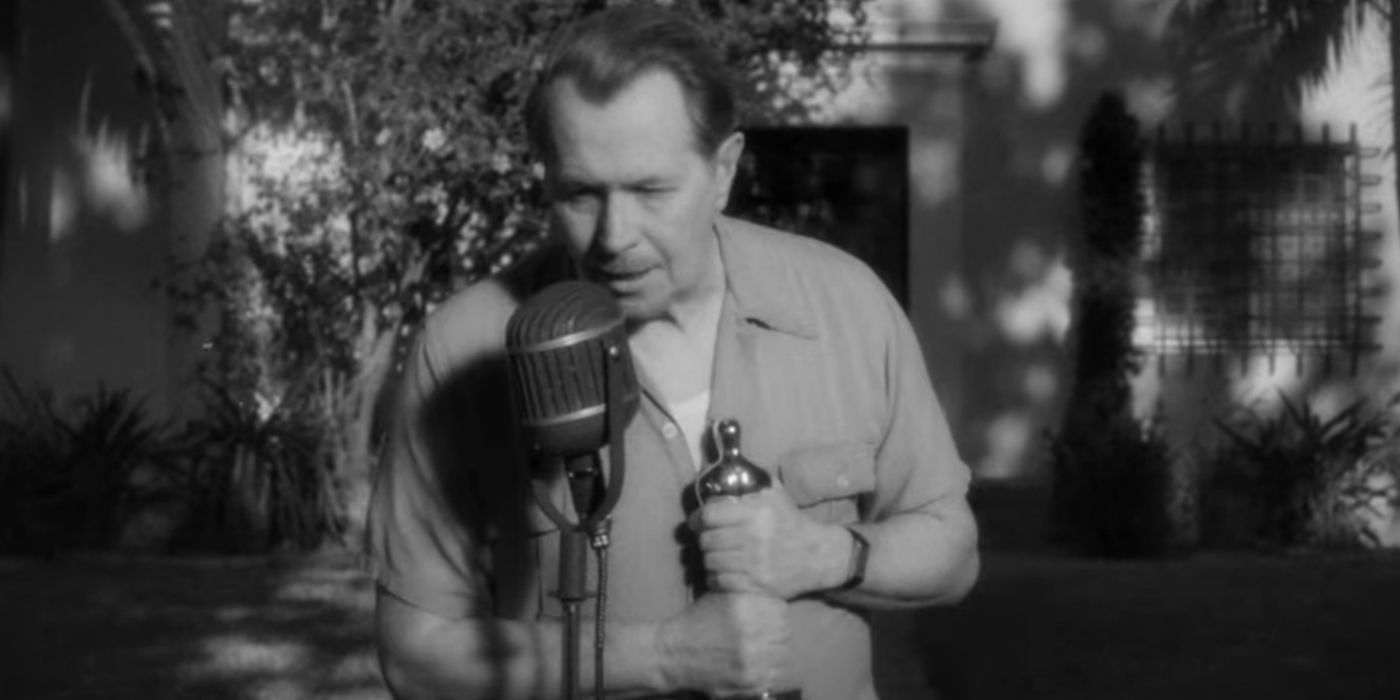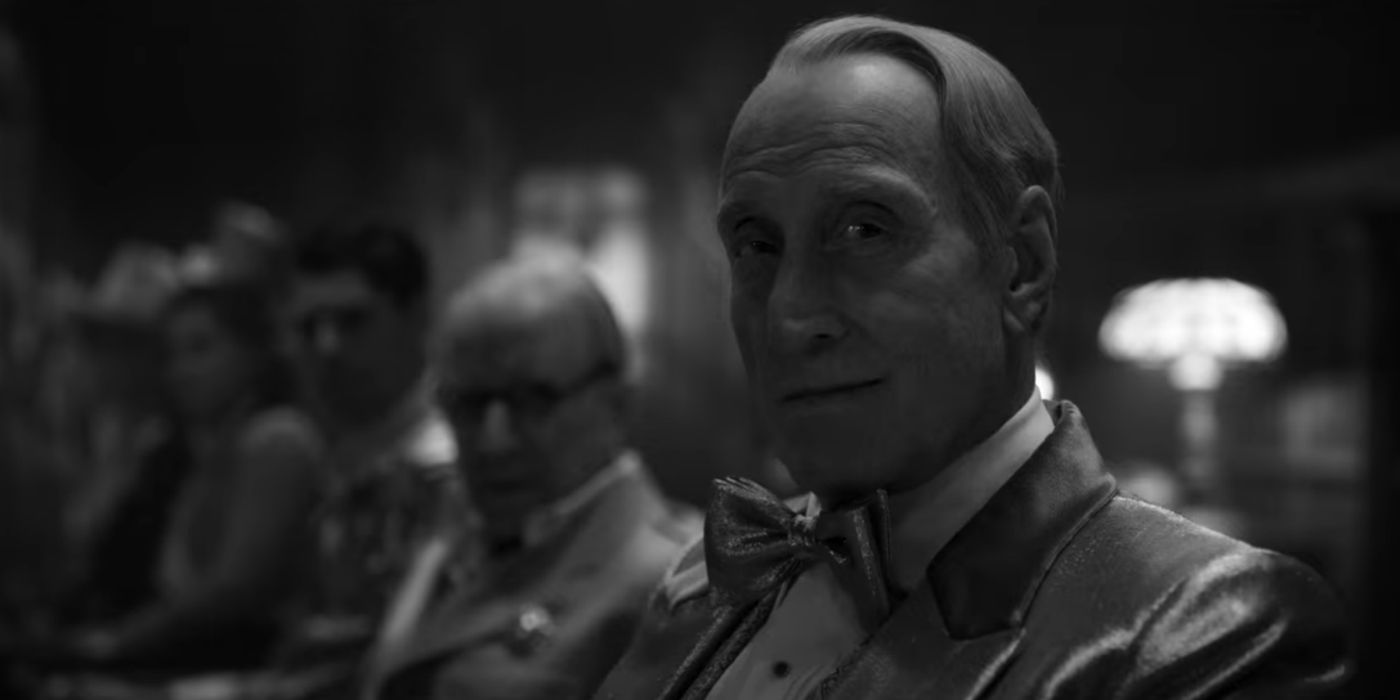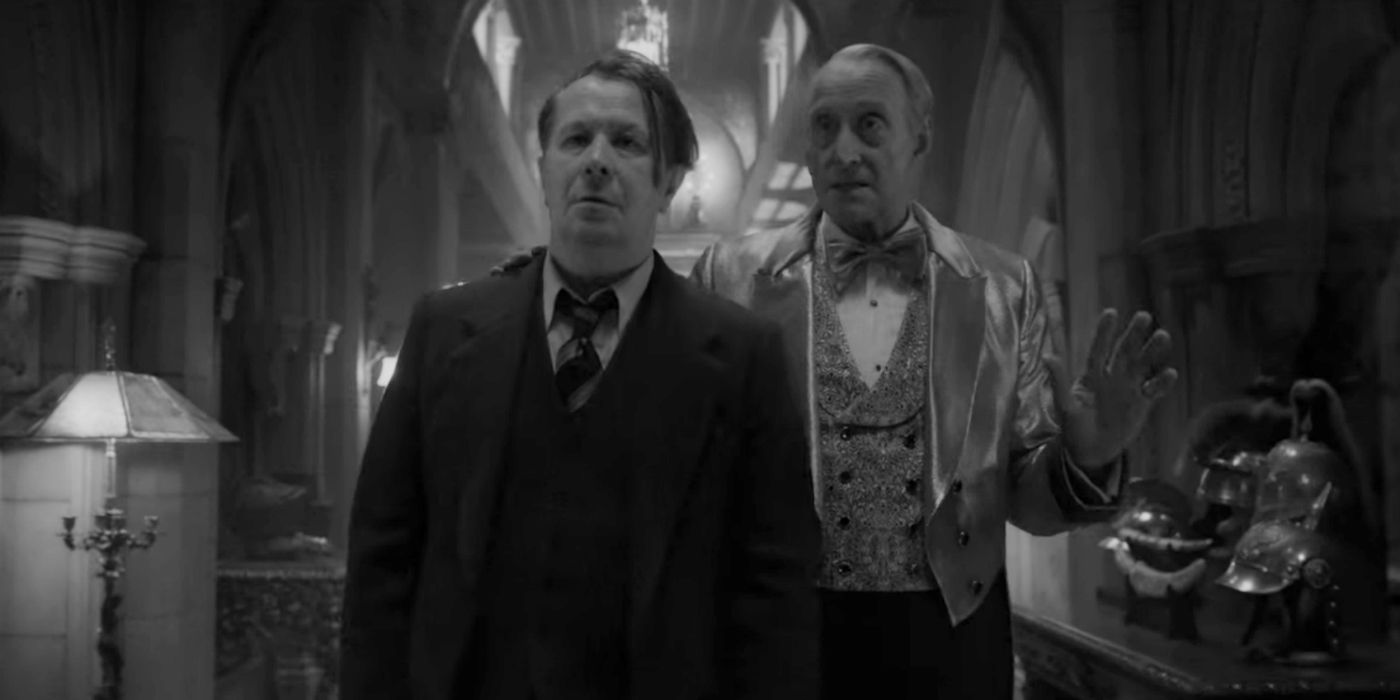David Fincher's Mank ends with a dispute over credit for Citizen Kane's screenplay and its subsequent Oscar win, including speeches from its two writers, Herman J. Mankiewicz and Orson Welles - here's what happens in the ending and what it means. Directed by David Fincher from a script by his late father, Jack, the film marks the Fight Club's helmer's first movie since 2014's Gone Girl, and is a long-gestating passion project. Originally envisaged to star Kevin Spacey and Jodie Foster, Mank instead features Gary Oldman and Amanda Seyfried in its leading roles.
The film documents Mankiewicz (aka Mank)'s time writing Citizen Kane while being pressured by the looming presence of the wunderkind Welles, and flashes back to tell a broader tale of Mank's career, Hollywood movie studios and their politics. Mank is at once an ideal companion piece to Citizen Kane, an homage to how movies used to be made (looking and feeling like something out of the late-1930s or early-1940s) and a cynical takedown of the studio system (then and now).
The ultimate destination of Mank is, of course, well-known, with the end product - Citizen Kane - regarded as one of if not the greatest movies of all time. And yet Fincher & Co. wring dramatic tension from the journey there and Mankiewicz's relationships with the key players, not to mention his own demons, right up until the very end, with a bittersweet denouement that leaves some important questions behind.
Why Mank Crashed William Randolph Hearst's Dinner Party
One of the major set pieces in Mank comes towards the end, as the flashbacks approach their own conclusion: Herman J. Mankiewicz turns up drunk at a circus-themed party hosted by William Randolph Hearst (who is known to have thrown similar parties in real-life). Not only is it a chance for some of Mank's greatest wordplay - "the white wine came up with the fish" - but it is also the scene that best captures the movie's titular character's life up to that point and the decisions he makes afterwards. There's a sly brilliance in the juxtaposition of costumes and meaning: at the party, Mank is the only character not wearing circus attire, and yet it's here where his true role as the court jester for Hearst, Louis. B. Mayer and the rest is painfully confirmed. Herman Mankiewicz may be (or may have been) a talented screenwriter, but now he's only kept around because Hearst likes his wit and thinks him good fun at parties.
And yet, the circus dinner party also keeps with the film's presentation of Mank himself: washed-up he may be, but he's still the sharpest mind (and tongue) in the room, and here he is the only one willing to speak, or at least drunkenly slur, truth to power. Previously Mank went along with the whims of the others: he may have shown his own proclivity for socialism, for instance, but in the end he still danced to the tune the big wigs above him played. As Hearst tells him at the end of this sequence, he is the monkey, not the organ-grinder; he's there to amuse, not to influence. Between Mank's word vomit and literal vomit, he exposes the Hollywood elites for what they truly are, although only he and Marion Davies seem to buy into it, but even that's enough. What matters most for Mank is that, at last, he can finally see and speak the truth, and those events can lead to him being much more than Hearst's monkey.
Why Mank Changed His Mind About Not Wanting A Citizen Kane Credit
Early on in the writing process of Citizen Kane, Herman J. Mankiewicz readily forgoes a screenplay credit for the movie. This itself isn't too surprising: Mank was known to have written or helped write dozens of scripts without receiving a credit for them, usually due to him being brought in to fix or touch up other screenplays with a dose of his trademark humor. By this time, he was on the outs from the other major studios, and clearly happy to have the work. Since he was being brought on as a script doctor, with all credit intended to go to Orson Welles - the multi-hyphenate on whom the hopes of RKO were pinned - then Mankiewicz's name wouldn't be in the movie.
Fast-forward to the ending of Mank, and the writer has had a change of heart. No matter what Welles offers or threatens, Mankiewicz demands - and eventually gets - credit. The major turning points, ironically enough, come from the swath of visitors - including Marion Davies and Mank's brother, Joseph - who attempt to dissuade him from writing a movie about Hearst. What shines through, and what Mankiewicz himself finally accepts, is that the screenplay for Citizen Kane is a work of brilliance: the best thing he has ever written. At this point in his life, Mank is a washed-up alcoholic whose dreams of ever writing (much less being credited) for such a picture had all but vanished. But to truly be able to produce something good and know that it is fully his own work is invaluable to him at this stage, and worth far more than Welles and RKO could possibly offer after years of feeling that he was utterly worthless.
There is also a sense of Mank wanting to make sure his name on it, now that it's clear to everyone who Citizen Kane is about. It's no coincidence that the scenes with Welles and Mankiewicz arguing over credit come after the monkey and organ-grinder speech from Hearst. While previously Mank may have been tempted to hide his attack by not having his name, he clearly feels a sense of desire to get back at him. Again, this becomes greater than a screenplay for Mank, but a representation that he is more than what Hearst, Mayer, and the others at MGM thought him to be.
Orson Welles Oscar Speech: What “Mank, You Can Kiss My Half" Means
After lodging a complain with the Screen Writers Guild, RKO did eventually give Herman Mankiewicz the credit he desired on Citizen Kane. Not only that, but his name was ultimately put before Orson Welles' in the screenplay credit, which was apparently done at the behest of Welles himself. Come the Academy Awards, Citizen Kane was nominated for a total of nine Oscars, but took home only one. For all Welles' individual genius, it was the part of the film he shared that took him the trophy (albeit more because it was a victim of Academy politics), though neither man was there to collect it. In Mank, a radio broadcast of Welles while working on the movie All Is True in Rio de Janeiro plays, where he has a message for his co-writer: "Mank, you can kiss my half." Clearly intended by Welles as a lighthearted riff on "kiss my a*s," the "kiss my half" line was fleshed out further in writing. In a note the director sent to Mankiewicz from Rio, he wrote:
"Dear Mankie:
Here’s what I wanted to wire you after the Academy Dinner: ‘You can kiss my half.’
I dare to send it through the mails only now I find it possible to enclose a ready-made retort. I don’t presume to write your jokes for you, but you ought to like this: ‘Dear Orson: You don’t know your half from a whole in the ground.’
Affectionately,
Orson
The note, and the comment in Mank, show the two sides of Welles: there's affection in there towards Mankiewicz for sure - feelings that were not reciprocated, with the scribe becoming more embittered towards his co-author - but it also serves to rebuke Mank's own notions that Welles was not involved in writing Citizen Kane. While the director does acknowledge in his note that he does not write for Mankiewicz, the fact he tells him to "kiss his half" could be seen as disrespectful (especially without the intended retort), and shows that he does also believe himself worthy of the credit, and that the screenplay truly is half his. He'd prefer for Mank to accept that, but it doesn't make too much of a difference to Welles.
Herman J. Mankiewicz’s Oscar Speech Explained
In contrast to Orson Welles' very brief remark, Herman J. Mankiewicz gives a slightly longer speech when he accepts his own Oscar statue, saying:"I am very happy to accept this award in the manner in which the screenplay was written, which is to say, in the absence of Orson Welles. How's that?" When then asked how come Welles shared credit, Mankiewicz dryly responds: "Well that, my friend, is the magic of the movies." The line is bound to re-ignite one of the oldest debates in Hollywood: who truly deserves the screenplay credit for Citizen Kane? Mank itself was written by Jack Fincher largely based on the work of famed critic Pauline Kael, who believed Mankiewicz the sole author of the movie. Viewed through that lens, then Mank's ending could be seen as supporting that theory.
However, that does not entirely fit with either Mank's production nor what the film itself shows. David Fincher and Eric Roth polished the script to make it slightly more sympathetic to Welles, a filmmaker it's clear from Fincher's entire body of work - not least The Social Network - the director holds in high esteem. Both historical evidence and Mank itself strongly suggest that Welles did help contribute to the story of Mank, even if the words were written down by Mankiewicz, since he worked on the idea and subsequent revisions during production. And so in that sense, Mank's Oscar acceptance speech is less about the credit, and more about what writing the screenplay means to him.
Again, this goes back to the idea of Mankiewicz reclaiming a sense of value in both his work and in himself as a person that had previously been lost, seemingly for good. Citizen Kane could have been where Herman J. Mankiewicz faded out of existence for good, and in some ways it was - as the cards at the end note, he didn't do much afterwards. But at the same time, it was his last and greatest hurrah, and all of that was something that he achieved by himself, in the absence of Orson Welles.
The "magic of the movies," line, on the other hand, reads a little more cynical. While it's a classic piece of Mank wit - something that's historically known and clearly displayed throughout the film - it also speaks to what that "magic" really is and, in truth, is clearly viewed as anything but magical. Instead, that line tells of Mankiewicz's - and Fincher's - disapproving view of the studio system, and of the bureaucracy and politics involved in making a motion picture. It's the "magic" that led to Mankiewicz writing Citizen Kane in the first place, to Welles sharing a credit, and to one of the greatest movies of all time being almost completely overlooked by the Academy Awards.
What Happened After Mank’s Ending
The ending of Mank is a relatively downbeat one in terms of Herman J. Mankiewicz's life story. Mankiewicz never wrote a screenplay again, and could not escape the alcohol addiction that he had for much of his life (as he noted with his "rat" line, which came just a couple of years after Citizen Kane's release), and ultimately ended it sadly early, at the age of just 55. By contrast, Orson Welles did, of course, go on to continue carving out a career that would ultimately see him regarded as one of the greatest filmmakers of all time. The movie he is shooting at the end of Mank, It's All True, was one of several wartime pictures Welles produced, before he left for Europe in the late 1940s, where he would spend much of his career able to work with independents outside of the big Hollywood studio system. Welles worked right up until his death in 1985, during production on the long-gestating The Other Side of the Wind, which Netflix finally released in 2018.
Another of Mank's characters also found much greater fortune after the movie's ending: Mankiewicz's brother, Joseph. It was already clear before the ending that he was eclipsing his older brother, at least in terms of achievements if not talent. His credits included producing The Philadelphia Story, which was nominated for Best Picture at the Academy Awards, and then directing both A Letter To Three Wives and All About Eve, which saw him win back-to-back Best Director Oscars.
William Randolph Hearst, the not-so-secret inspiration for Citizen Kane, was unsurprisingly outraged at the movie. The preceding years had not been kind to Hearst: while the circus party viewers see him at in Mank is lavish, in reality he was facing financial ruin after a series of bad movie investments. Staff were cut, he lost a lot of money, and even had to accept a loan from Marion Davies; Hearst was publicly embarrassed, but was able to come back with his newspapers and advertising during World War II. Still a wielder of some influence at this point, Hearst banned his newspapers from even so much as mentioning the film, and even had Welles sued for libel, while he also prevented several movie theaters from showing it too. Ultimately this didn't go too far, in that Citizen Kane was still lavished by critics, and eventually Hearst's anger subsided somewhat - with Citizen Kane finally shown at Hearst Castle in 2012. Hearst himself passed away in 1951 at the age of 88.
Davies was even more hurt than Hearst was by Citizen Kane. The public perception is that Susan Alexander Kane was based upon her - an idea Mank itself wrestles with, and tries to offer redemption for, by showing just how brilliant Mankiewicz thought her to be - and that was something she couldn't shake. Her acting career was already over, but her legacy was left in tatters too. Davies stayed with Hearst until his death, and passed away herself a decade later. Even by that point, the myth that she wasn't a great actress sadly persisted, though critics - and Welles himself - have attempted to re-define her legacy in subsequent years, which Mank should hopefully help with.
What Mank’s Ending Really Means
Mank's ending is the bittersweet culmination of what follows. The film itself sets out its mission statement earlier: that you cannot capture a person's life in two hours, but only hope to leave the impression of one. That is certainly what Mank achieves with Herman J. Mankiewicz: the movie doesn't delve into his earlier years, and even after watching viewers may be left wondering just what other movies he actually wrote. But who he was as a person - his great talent and the price he had to pay for it - shines through brightly, if somewhat sadly too, at the end. Mank was a complicated figure, but his ending gives him a sense of renewed power and a final Hollywood victory. He may not be the organ-grinder, but he at least made sure everyone knows the monkey is every bit as important.
In a broader sense, it's tempting to see Mank as a love letter to the Hollywood of old. It's true in a sense, with Fincher painstakingly and loving crafting his movie to resemble something of a bygone and ostensibly better age. But the director also cuts through such notions that it was better then while also not arguing that it's better now: his cynicism, arguably even contempt, for the major studios and the people who are responsible for green lighting movies but have little passion for them, is clear in a portrayal of a broken system that would ultimately fail, yet rise again in an altered form. Fincher also draws other modern parallels - much like Citizen Kane has remained timeless, there's a relevancy to his work, be it the auteur struggling under the weight of the studio, fighting for control (in an era where reshoots and director cuts are so prevalent), while the attack ads are literally fake news, and his politics come through as well as Mank, the audience's viewpoint and smartest person in the room, supports the politician who'll actually make real societal change. Mank shows that David Fincher loves movies, but he doesn't love Hollywood.

